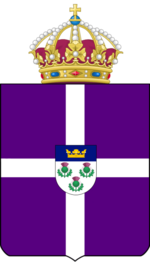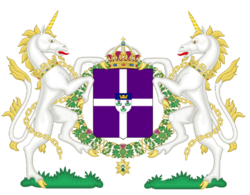Foreign relations of Caldia: Difference between revisions
| Line 39: | Line 39: | ||
*[[Euclean Community|EC]] | *[[Euclean Community|EC]] | ||
*[[Euclean Law Enforcement Cooperation Organization|ELECO]] | *[[Euclean Law Enforcement Cooperation Organization|ELECO]] | ||
*[[International Federation of the Blue Crystal Movement|FIMCB]] | |||
*[[Global Health Institute|GHI]] | *[[Global Health Institute|GHI]] | ||
*[[Global Institute for Fiscal Affairs|GIFA]] | *[[Global Institute for Fiscal Affairs|GIFA]] | ||
Revision as of 00:06, 2 January 2022
This article is incomplete because it is pending further input from participants, or it is a work-in-progress by one author. Please comment on this article's talk page to share your input, comments and questions. Note: To contribute to this article, you may need to seek help from the author(s) of this page. |
 |
|---|
| This article is part of a series on the politics and government of Caldia |
|
|
The foreign policy of Caldia is based on the principles of non-alignment in times of peace and neutrality in wartime. Remaining outside of military alliances allows Caldia to maintain neutrality in the event of war. This premise includes the belief that non-involvement is the best serves Caldia's national security. However, it is required by the common defense clause of the come to the defense of other member-states in the event of a declaration of war. In 2017, the Caldish government spend 1.5% of the Gross National Product on defense. This is relatively low compared to many other Euclean nations. Foreign policy is coordinated by the Ministry of Foreign Affairs, currently led by Séamus Ó Faoláin.
Community of Nations
Caldia has been a member of the Community of Nations since its foundation in February 1935. It has actively participated in the organization, leading a number of efforts in the International Assembly, serving as an elected member of the Security Committee on several occasions, and sending Seán Fitzgerald to serve as Secretary-General from 1955 60 1961. The Caldish government views international cooperation and peacekeeping efforts through the Community of Nations as essential to maintaining global stability.
The CN maintains an office in Garrafrauns, and the Treaty for the End of Nuclear Armament Proliferation in the World was negotiated in Garrafrauns and signed in Shanbally in 1965.
Euclean Community
Caldia joined the Euclean Community under the leadership of Taoiseach Seamus Mac Amhlaidh in 1955 alongside Varienland and Werania. The application was submitted and negotiations began in 1952. Mac Amhlaidh pursued a policy of rapprochement with Estmere and Werania that allowed Caldia to join the EC. The decision was met with controversy as some argued the nature of the common defense clause would force the Caldish government to go back on its policy of non-alignment. However, others viewed Caldish membership as natural and favored economic cooperation with Eastern Euclea. To address the controversy, Mac Amhlaidh declined to join the Euclean Defense Treaty Organization and secured the right to opt out of any future military agreements for the next 50 years.
Since joining, Caldia has been an active member of the EC. It joined the Euclean Monetary Union and the Euclozone in 1983 and participates in all EC organizations and institutions. Under Alexis Walker, the Caldish government became increasingly pro-Euclea. Caldia sent Caitríona Níc Donnchadh to serve as the High Commissioner from 2014 to 2017. Walker has served as the elected President of the Euclean Community since 2017.
Northern Forum
The Caldish government takes a multilateral approach to international affairs. It founded the Northern Forum in 1952 alongside its neighbors in Northern Euclea in order to reach consensus and further cooperation in the region. Together, they work together in areas that include the environment and infrastructure, coordinate joint policy within the Euclean Community, and cooperate indirectly in domestic politics through consultation and coordination.
Non-alignment and neutrality
Caldia's doctrine of neutrality dates back to the early 18th century. The country has not been at war since 1709 and celebrated 300 years of peace in 2009, one of the longest records in recorded history. During the Great War, the Caldish government maintained its policy of neutrality. However, it was violated following the joint Estmerish-Weranian invasion of the nation.
In order to allow for a policy of neutrality in wartime, the government maintains a policy of non-alignment in peacetime. Caldia has not participated in a military alliance since the early 18th century. The government maintains a policy if non-participation in military agreements, preventing it from joining the EDTO. Treaty of Kesselbourg requires Caldia to come to the aid of EC member-states should one be targeted by a declaration of war. While this breaks with the policy of non-alignment, Caldia is politically and economically integrated into the Euclean Community. The Caldish security doctrine allows for cooperation in the event of threats against peace and security. Issues of Euclean security are considered to be issues of Caldish national security, allowing Caldia to participate in the common defense clause.
Caldish neutrality has allowed it to serve as a mediator in military conflicts and political disputes. It also regularly acts as a protecting power for a number of nations around the world. While it typically serves as a protecting power for EC member-states, it has also acted as one for states who have broken off ties with Euclean nations. Currently, Caldia serves as the protecting power for Estmere in Zorasan after diplomatic relations were suspended during the 2019 Estmere-Zorasan Crisis.
Military
Since the end of the Great War, the Caldish military has been deployed on numerous occasions in peacekeeping operations conducted by the Community of Nations. Such deployments included peacekeeping efforts in Tsabara, ???, and ???. For the military to be deployed to an active conflict zone, a "triple-lock" system is in place that requires the approval of the Comhthionól Náisiúnta, the cabinet, and the monarch. The monarch acts on the advice of the High Commander of the Caldish Defesne Forces. Caldish participation in peacekeeping efforts fulfills the government's stated desire to pursue multilateral coalitions to meet its foreign policy goals.
Participation in international organizations
Diplomatic relations with other nations
Caldia maintains permanent diplomatic missions in over fifty countries. Dozens of foreign countries maintain an embassy in Caldia, all of which are located in the capital. There are also a number of consulates maintained by foreign governments in Caldia. When a new ambassador or consul is sent to Caldia by a foreign nation, they are received by the monarch to whom they present their letter of credence.
| Country | Formal relations began | Embassy | Other missions | Notes |
|---|---|---|---|---|
| 1955 | Embassy in Spalgleann opened in 1956. Embassy in Banabadura opened in 1957. |
Current ambassador is Tanveer Lehga. | ||
| 1992 | N/A | A non-resident Bamvangan ambassador is assigned in the Bamvangan embassy in Westbrücken. A non-resident Caldish ambassador is assigned from Caldia's embassy in Girota. | ||
| 1938 | Embassy in Spalgleann opened in 1938. Embassy in Newstead opened in 1938. |
Current ambassador to Caldia is Erica Bilde. | ||
| 1936 | Embassy in Spalgleann opened in 1940. Embassy in Dyńsk opened in 1938. |
|||
| File:Eldmark.png Eldmark | ||||
| Template:Country data Estmere | Embassy in Spalgleann opened in 1791. Embassy in Morwall opened in 1802. |
|||
| 1971 | Embassy in Spalgleann opened in 1971. Embassy in Mambiza opened in 1971. |
The Caldish embassy in Mambiza also maintains non-resident ambassadors to Masari and both North and South Kabu. | ||
| 1801 | Embassy in Spalgleann opened in 1801. Embassy in Verlois opened in 1801. |
Gaullica has operated a consulate in Pennsea since the early 18th century. | Despite the transition of government from monarchy to republic following the end of the Great War; Gaullica and Caldia maintained the existing embassies. | |
| File:ImaguaFlag.png Imagua and the Assimas | 1948 | Embassy in Spalgleann opened in 1949. Embassy in Cuanstad opened in 1950. |
Current ambassador to Caldia is Gerard O'Hea | |
| 1935 | Embassy in Spálgleann, opened 1935. Embassy in Montecara, opened in 1935. |
Embassy in Spálgleann also hosts the Permanent Mission of Montecara to the International Council for Democracy. Embassy in Montecara closed from 1944 to 1946 due to the Etrurian occupation. | ||
| 1956 | Embassy in Spálgleann, opened 1958. Embassy in Kinadica, opened in 1959. |
|||
| 1937 | Embassy in Spalgleann, opened in 1937. | A non-resident Caldish ambassador is assigned from Caldia's embassy in Hammarvik. Caldia previously had an embassy that was closed in 2006. | ||
| 1873 | Consulate in Garrafrauns opened in 1873, moved and upgraded to an embassy in Spalgleann in 1910. Consulate opened in Samistopol in 1873, upgraded to an embassy in 1910. |
Caldia maintains a consulate in Patovatra. | The Caldish embassy in Samistopol also hosts non-resident ambassadors to Kantemosha, Radushia and Ravnia. | |
| 1935 | Embassy in Spalgleann opened in 1935. Embassy in Dražovice opened in 1936. |
A Caldish consulate exist in Graštnik. A Slirnian consulate exists in Shanbally. |
Diplomatic relations between Spalgleann and Dražovice date from at least the Unio Trium Nationum; however, the date of establishment of the Principality of Slirnia marks the start of formal relations in the modern era | |
| 1842 | Embassy in Spalgleann, opened 1870 as Consulate-General, upgraded to Embassy in 1942 Embassy in Westbrücken |
Current ambassador is Edith Grünbaum. | ||
| 1946 | Embassy in Spalgleann, opened 1984. Embassy in Rongzhuo, opened in 2010. |
Current ambassador is Cai Xianliang. | ||
| 1967 | Embassy in Spalgleann, opened 1969, closed 1971, reopened in 1997. Embassy in Girota, opened in 1999. |
Current ambassador is Melku Zanata. |
